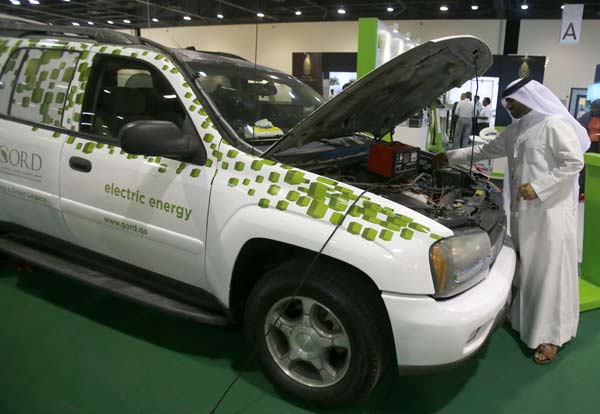Equity 'not addressed' in climate talks
Updated: 2012-12-01 02:56
By Wu Wencong in Doha, Qatar (China Daily)
|
|||||||||||
Long-term equity concerns are not being adequately addressed in climate negotiations so far, said Chinese scholars, emphasizing that equity is not a barrier to further emission reductions, but a key enabler of them.
 |
|
A man inspects the engine of a hybrid test car at a display of environment friendly vehicles during the United Nations 18th Climate Change Conference in Doha on Friday. Karim Jaafar / Agence France-Presse |
At a side event held at the China Pavilion on Friday, scholars from China released a report on developed and developing countries' responsibilities for climate change and carbon dioxide mitigation using a model generated by independent research.
It shows that developed countries accounted for about two-thirds of global warming from 1850 to 2005, but they only contributed to one-third of mitigation efforts. The case for developing countries is just the opposite: They accounted for one-third of global warming, but contributed to two-thirds of the mitigation efforts.
Current commitments by developed countries cannot effectively curb climate change, nor do they reflect their ethical responsibility, said Cui Xuefeng from Beijing Normal University, one of the report's authors.
"Stronger mitigation efforts by developed countries are needed to keep temperature rise below the 2 C objective on the basis of equity in the future," he said.
A report released by the UN Environment Program and the European Climate Foundation on Nov 20 showed that the emissions gap is bigger than earlier assessments. Current greenhouse gas emission levels are already about 14 percent above where they need to be in 2020.
Li Ting, senior policy consultant from the School of Public Policy and Management of Tsinghua University, said emphasizing equity does not mean that developing countries care only about emission rights, nor does addressing the importance of "common but differentiated responsibilities" mean taking no action.
"I really think the rights to development are much bigger and meaningful than just emission rights," said Li.
She said sustainable development is the only approach to the future of the Earth and its climate system. Without poverty eradication and sustainable development, human beings will not be able to protect the climate. "The current way of sharing is not sustainable and not fair," she said.
The report released on Friday was published in the journal Proceedings of the National Academy of Sciences of the United States of America in August. The models applied for the research will be used in the fifth Assessment Report of the Intergovernmental Panel on Climate Change.
Contact the writer at wuwencong@chinadaily.com.cnRelated Stories
Focus of Doha climate talks 2012-11-30 09:20
Climate talks may be just a lot of hot air 2012-11-29 15:45
Climate talks must generate more solutions 2012-11-29 08:02
UN climate talks seen falling short despite fears 2012-11-26 13:41
Today's Top News
President Xi confident in recovery from quake
H7N9 update: 104 cases, 21 deaths
Telecom workers restore links
Coal mine blast kills 18 in Jilin
Intl scholarship puts China on the map
More bird flu patients discharged
Gold loses sheen, but still a safe bet
US 'turns blind eye to human rights'
Hot Topics
Lunar probe , China growth forecasts, Emission rules get tougher, China seen through 'colored lens', International board,
Editor's Picks

|

|

|

|

|

|





